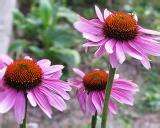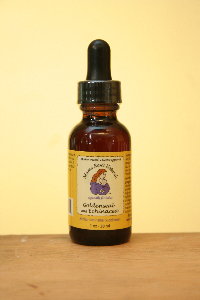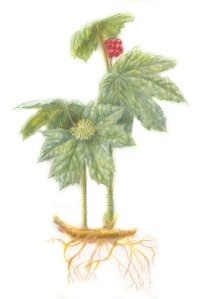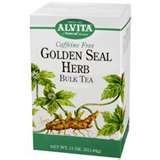| Share |  |
 | |||
God's Good Herbs - Seasonal Defense

Echinacea and Goldenseal
In the midst of our busy preparations for celebrating the Christmas season, no one wants their joy dampened or their strength diminished by coming down with a cold or flu. Oftentimes, however, lack of sufficient rest (along with such unhealthy activities as eating on the run and consuming too much sugar) weakens our immune system and makes us more susceptible to such an occurrence. Before running to the pharmacy to stock up on drugs that merely suppress symptoms, why not take advantage of what God has placed on this earth to give our bodies the needed support to resist or overcome any virus or bacteria we may encounter during this season?
There are many herbs in nature’s pharmacy that both build up the body’s defenses and relieve the symptoms of upper respiratory conditions. In a previous “God’s Good Herbs’ article (Nov. 2008) we looked at how substances in olive leaf work to fight against viruses and bacteria and inhibit the production of certain amino acids involved in their reproduction. In another article (March. 2009), we learned that garlic is considered one of the most effective natural antibiotics and how it can be used to prevent the common cold.
This month we are going to explore two herbs commonly used to stimulate the immune system to fight colds and bacterial infections and provide relief for the symptoms of these conditions. Keep in mind that these herbs afford many additional benefits to the body other than the ones covered in this article. However, our purpose in this article is to focus only on the attributes of these herbs that specifically pertain to overcoming colds and flu.
ECHINACEA
One of the better-known herbs for the prevention and treatment of upper respiratory conditions is echinacea, an herb used by American Indians for hundreds of years. It is recognized for helping the body fight colds, flu, bronchitis, strep throat and other immune and respiratory problems.
When taken in small, frequent doses at the first sign of symptoms, multiple studies have found that echinacea has reduced the intensity and duration of a respiratory illness and prevented it from becoming a full-blown infection. Even after exposure, it is thought to keep viruses from taking hold by blocking their receptors on the surface of the cells. Echinacea has immune-stimulating properties that activate the body’s infection-fighting capacity in several ways. The immune system considers the polysaccharide substances in echinacea to be foreign invaders, since they resemble bacteria. This conclusion causes the immune system to respond by producing white blood cells to fight the perceived bacteria which, in turn, strengthens the body and makes it more capable of fighting real bacterial invasion. Certain parts of echinacea also increase production of interferon (an anti-viral and anti-tumor agent naturally produced by the body), which stimulates the blood cells to engulf microbes, viruses, and cellular debris. In addition, echinacea increases the production another type of white blood cell, known as killer or T-cells.
Echinacea has immune-stimulating properties that activate the body’s infection-fighting capacity in several ways. The immune system considers the polysaccharide substances in echinacea to be foreign invaders, since they resemble bacteria. This conclusion causes the immune system to respond by producing white blood cells to fight the perceived bacteria which, in turn, strengthens the body and makes it more capable of fighting real bacterial invasion. Certain parts of echinacea also increase production of interferon (an anti-viral and anti-tumor agent naturally produced by the body), which stimulates the blood cells to engulf microbes, viruses, and cellular debris. In addition, echinacea increases the production another type of white blood cell, known as killer or T-cells.
At the University in Munich, scientists discovered that echinacea stimulated infection-fighting cells 30% more than pharmaceutical immune stimulants. In a separate study conducted with 180 individuals with cold and flu symptoms, it was concluded that the symptoms of those who received higher amounts of echinacea (900 mg) were significantly improved over both the group receiving a lower amount (450 mg. daily) of echinacea and the placebo group who received nothing.
Safety and Usage Guidelines
Results from extensive research on the safety of echinacea usage concluded that it is very safe for all ages, even when taken frequently and/or in high doses. The only people who should avoid echinacea are those with allergies to plants such as marigold or ragweed, any immune system dysfunction, blood clotting disorders or tuberculosis.
It is very important to choose high quality herbal formulations containing pure, organically-grown echinacea. Consumer Labs (an independent company that tests the purity of nutritional supplements) found that only four out of eleven brands of echinacea purchased for testing contained what was claimed on the label. More than half did not really contain the active ingredients indicated on the label, half were mislabeled as to the species of echinacea in the product and about 10% contained no echinacea at all.
When people “try herbs” and do not feel they are getting the results they hoped for, it is often because they have taken an inferior product that is missing or lacking in the active healing constituents contained in the herb. Buy products only from reputable,  well-established companies that have high testing and quality control standards and who guarantee the purity and potency of their products.
well-established companies that have high testing and quality control standards and who guarantee the purity and potency of their products.
Although it is not foolproof, there is one way that you can test the quality of echinacea extract for yourself. If the back of your tongue does not feel numb or tingly when you take the tincture, it indicates that there are very few active chemicals in that product. If you do experience those sensations, it more than likely is a good quality product. Also, check the manufacturing date – it should be no more than two to three years since the product was processed for tinctures and no more than six months to a year for powdered herbs in capsules, according to Christopher Hobbs who authored “The Echinacea Handbook.”
 Echinacea is best used for short periods of time, followed by a break to allow the immune system to rest before resuming ingestion. Some herbalists and doctors recommend using it for six to eight weeks at a time and taking a month off before starting another course of usage. Others say that when treating a cold, it is best to take it for three weeks, followed by a week off, throughout the course of the winter months if necessary.
Echinacea is best used for short periods of time, followed by a break to allow the immune system to rest before resuming ingestion. Some herbalists and doctors recommend using it for six to eight weeks at a time and taking a month off before starting another course of usage. Others say that when treating a cold, it is best to take it for three weeks, followed by a week off, throughout the course of the winter months if necessary.
The amount of echinacea to take can vary depending on the strength of the particular product you are using. As a general guideline, most herbalists would recommend taking two to three milliliters of standardized tincture every one to three waking hours or one to two capsules (300-400 mg.) every two to three waking hours for the first several days when symptomatic. Then the amounts can be reduced to two teaspoons of the tincture or six capsules per day over the next seven to ten days. For throat infections, a tincture of echinacea mixed with warm water may be used as a gargle. Herbalists also recommend using echinacea in combination with other herbs, such as goldenseal, astragalus or pau d’arco that can complement and reinforce its action.
GOLDENSEAL
Goldenseal is the root of a perennial herb in the buttercup family that has been ground into a powder. It is a powerful herb that has been studied extensively for its antibacterial properties and widely used in herbal formulas designed to strengthen the immune system and treat upper respiratory infections.  Goldenseal is thought to enhance the effectiveness of echinacea and tends to work best when combined with other immune stimulants and antibiotic herbs. In addition to its healing properties, this herb is an excellent source of vitamin C and trace minerals such as cobalt, iron, magnesium, manganese, silicon and zinc.
Goldenseal is thought to enhance the effectiveness of echinacea and tends to work best when combined with other immune stimulants and antibiotic herbs. In addition to its healing properties, this herb is an excellent source of vitamin C and trace minerals such as cobalt, iron, magnesium, manganese, silicon and zinc.
Berberine, an alkaloid in goldenseal, acts as a natural antibiotic to help combat the bacterial infections that often accompany colds and flu. This component of goldenseal, along with other related alkaloids, is thought to activate special white blood cells to create a powerful anti-microbial effect against many disease-causing organisms, including Streptococcus. This antibiotic benefit of berberine has proven to be more effective than many commonly used prescription antibiotics, yet it does not destroy beneficial bacteria or promote yeast overgrowth in the process. Unfortunately, most oral herbal preparations of goldenseal contain relatively small amounts of berberine and may not produce the same results as extracts of goldenseal with higher concentrations of this compound.
Goldenseal also has astringent properties that tighten blood vessels, which helps to tone mucus membranes and reduce swelling and inflammation in places such as glands and sinus cavities. It is thought by many to prevent a sinus infection from occurring if it is taken at the first sign of a possible respiratory infection. It also acts as a decongestant to relieve the respiratory tract of excess mucus. Goldenseal is a useful antiseptic and is often used as an eyewash and a gargle for sore throats.  Usage Guidelines
Usage Guidelines
Supplements containing goldenseal are available as tablets and capsules (containing the powdered root), liquid extracts or tinctures and glycerites (extract made with glycerin instead of alcohol). A typical dosage in the event of a respiratory infection or flu would be to take 10 to 15 drops of the extract or glycerites tincture two to three times a day for seven to 10 days. The recommended capsule amount is generally one capsule three to six times daily, depending on the severity of the condition.
Goldenseal is generally safe for short-term use. It should not be used however, by those who are pregnant, nursing or have high blood pressure. Infants or young children should not take it.
Due to the great popularity of goldenseal, the demand for this herb is greater than growers can supply. Because it is at risk of being overharvested and becoming an endangered species, people are advised to procure it from organic farms and avoid picking it in the wild.
Conclusion
Echinacea and goldenseal are just two of many herbs in nature’s pharmacy that God placed on this earth to support our bodies in warding off colds and flu or alleviating the symptoms they can produce. In addition to eating as healthy as you can and getting plenty of rest, I would recommend that you have some of these immune-enhancing herbs on hand to help prevent a cold or flu from spoiling your holidays.
Sources:
- Nutritional Herbology by Mark Pedersen
- Heinerman’s Encylopedia of Healing Herbs and Spices – John Heinerman
- Nature’s Pharmacy by Steven Horne
- http://www.umm.edu/altmed/articles/echinacea-000239.htm
- http://www.umm.edu/altmed/articles/goldenseal-000252.htm
- http://www.organicnutrition.co.uk/articles/colds.htm
- http://www.motherearthnews.com/Natural-Health/2007-12-07/Effective-Natural-Cold-and-Flu-Remedies.aspx?page=3
- http://www.howstuffworks.com/echinacea-herbal-remedies.htm
- http://www.herbs2000.com/herbs/herbs_elder.htm
- http://herbs.lovetoknow.com/Echinacea_and_Goldenseal_Study
- http://herbs.lovetoknow.com/What_Is_Goldenseal_Used_For
- http://findarticles.com/p/articles/mi_m0NAH/is_n1_v27/ai_20152677/
Copyright © 2008-2015 Lucinda Bedogne, CNHP, CNC
Reader Comments...
| 2011-07-10 05:21:59 "Various people in the world receive the mortgage loans from different banks, because that is comfortable and fast. " - Aimee |
Post Your Comment...
|
|
||||||||||||


